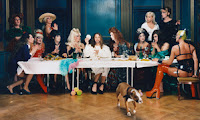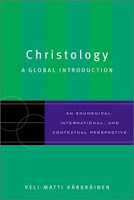I'm thrilled to have had this incredible, challenging, enlightening experience, but I find that I'm also feeling a bit sad.
It's a survey course, really, starting with Biblical Christology and ending with Interfaith Christology.
In between, we've reviewed Historical (or Christ of the Councils) Christology and The Quest for the Historical Jesus. We took a side step into Jesus and Contemporary Art, moved through Western Christology, including Barth, Pannenberg, Bultmann, Tillich, Rahner and Moltmann - all white men, all attempting to understand Jesus through the lens of philosophy.
Then, we listen to voices which are not given too much of an audience among those with a strict adherence to Patristics or "classical" (read: white, Western European male) perspective.
We read Feminist theologians like Daly, Ruther and Johnson, The Black Christ from theologians like Cone, Cleage and Roberts, and the Womanist Christ from theologians like Douglas, Terrell, and Williams.
We moved on to The Latin American Christ, reading Gutierrez, Gonzalez, Aponte, De La Torre, and Recinos, and Latin@, Mujerista Christology, reading primarily to the incomparable voice of Ada Maria Isasi-Diaz in "Identificate con Nosotras".
On to the African Christ, then, reading John Onaiyekan and John Mbiti and Benezet Bujo, and the African Feminist Christ, reading, "Jesus", the powerful work of Mercy Amba Oduyoye.
Next up: The Asian Christ, reading Japanese theologian Kosuke Koyama, Choan-Seng Song from Taiwan, and the Asian Feminist from Sharon A. Bong and Monica Jyotsna Melanchthon in Kwok Pui Lan's "Hope Abundant".
On then, to the Marginality of The Asian American Christ, The Indigenous Christ, The Ecological Christ and the Postcolonial Christ, with voices like Lee Miena Skye, Andrea Smith, Denis Edwards, Jung Young Lee, Archiel Peelman, and Kwok Pui Lan.
I was challenged by the work of Robert E. Gross in The Queer Christ, with the additional voices of Marcella Althaus-Reid, Patrick S. Cheng, Marvin Ellison, Carter Heyward's incomparible lesbian feminist voice, as well as Justin Tanis in "Trans-Gendered: Theology, Ministry, and Communities of Faith".
Finally, we heard from The Interfaith Christ, listening to Clara Luz Ajo Lazaro in "Jesus and Mary Dance with the Orishas: Theological Elements in Interreligious Dialogue" in the book "Hope Abundant", and the deeply moving voices of Nancy L. Eisland and Thomas E. Reynolds who articulate a vision of The Disabled Christ.
Sound exhausting? Let me tell you something: this is not an exhaustive list. These were just some of the works and some of the theologians who jumped out at me from my copious notes.
This also doesn't tell you about the many varied layers of Christology, from above (divine) to below (human), from ontological (being) to functional (work) and from Transcendent (divine) to Immanent (works).
It's been a rich, abundant feast of the many ways many people strive to answer the question Jesus asks of his disciples in Mark 8:29, "Who do you say I am?"
Truth be told, I am in no way tired and I wouldn't give nothing for my journey now.
If you want a concise summary of these works, I would highly recommend the book, "Christology: A Global Introduction - An Ecumenical, International and Contextual Perspective," by Veli-Matti-Karkkainen. It's pretty comprehensive and gives you a taste for the depth of work that's out there.
In class today, we each presented a summary of our final project in which we are to construct our own Christology from our own social location and personal experience of Jesus.
Let me tell you, it's a heck of a lot harder than it sounds. It's ever so much easier to regurgitate what you've read or learned than to construct your own Christology.
We are to interact with Jesus in Scripture and then choose "one or two" theologians with whom we are to engage in conversation. All in 15-20 pages.
Right.
Guess what I'm going to be doing from now until May 16 - by no later than 5 PM Eastern Time, according to the information on my Class Syllabus?
Honestly? I can't wait to begin.
Patrick mentioned in class today that he believes Christology is a symbolic work that can bring us together rather than pull us apart.
I believe that, too. Except I know that, at the root of all of the troubles in the church in general and the Anglican Communion in particular is the insistence that only one of us can have it "right".
Every trouble, every conflict, every schism, has as its root cause in the idea of a superior or 'orthodox' or correct Christology.
Rather than rejoicing that Jesus is alive in so many ways for so many people, we squabble about who will get an A+ on our heavenly report card.
Who knew what trouble Jesus would have unleashed by asking a simple question, "Who do you say that I am?"
St Paul tells the ancient Church in Corinth:
"Even so the body is not made up of one part but of many.No division in the body. That's the goal. We all fall terribly short and miss the mark because of our own pride and arrogance.
Now if the foot should say, “Because I am not a hand, I do not belong to the body,” it would not for that reason stop being part of the body. And if the ear should say, “Because I am not an eye, I do not belong to the body,” it would not for that reason stop being part of the body. If the whole body were an eye, where would the sense of hearing be? If the whole body were an ear, where would the sense of smell be? But in fact God has placed the parts in the body, every one of them, just as he wanted them to be. If they were all one part, where would the body be? As it is, there are many parts, but one body.
The eye cannot say to the hand, “I don’t need you!” And the head cannot say to the feet, “I don’t need you!” On the contrary, those parts of the body that seem to be weaker are indispensable, and the parts that we think are less honorable we treat with special honor. And the parts that are unpresentable are treated with special modesty, while our presentable parts need no special treatment. But God has put the body together, giving greater honor to the parts that lacked it, so that there should be no division in the body, but that its parts should have equal concern for each other. If one part suffers, every part suffers with it; if one part is honored, every part rejoices with it." (I Corinthians 12:14-26)
I have become convinced, over these past twelve classes, that if we each studied the other's contextual Christology and then did our own, we would be a much healthier church.
We most certainly would not need an Anglican Covenant with its punitive, retributive, Western post-colonialist posture, which tries to keep the communion together by sacrificing the ability of each disciple to respond to the question of Jesus on the altar of the false god of unity.
My class has ended, but in many ways, after 12 weeks of class and 25 years of ordained ministry, my work has just begun.
I invite you to consider, from your own social location, your own experience of Jesus as you have come to understand Him in the gospels, and your own intellectual inquiry, engaging in conversation with other theologians who have discerned their own image and understanding of Jesus from their own social location and experience, to answer the question for yourself.
As a faithful disciple of Jesus, how do you respond when He asks YOU:
"Who do you say I am?"








3 comments:
Pleased to hear that you have had such an ninvigorating experience. Elizabeth. I always find it enhancing to be taught by people who are well versed in their subject and are able to communicate well. The subject material appears to have been extensive and I am grateful for your references which I will be taking up.
I have been answering the question for myself for a whiles now and am equally passionate to encourage others to do so.
Thanks, me. Jesus has been different at different times in my life. So has God. I don't think there is a "right"or "wrong" way to be in relationship with God or Jesus. There's just your way. Which is why, I think, Jesus asked the question. At least, in part.
This sounds like such a rich class ...I'm jealous! Thanks for sharing, and now I'm off to do my "homework". :-)
One of my beliefs is that God blessed us with many different religions so that we each might have a bit of understanding to share, which would draw us together. I hope some day we will do that.
Post a Comment